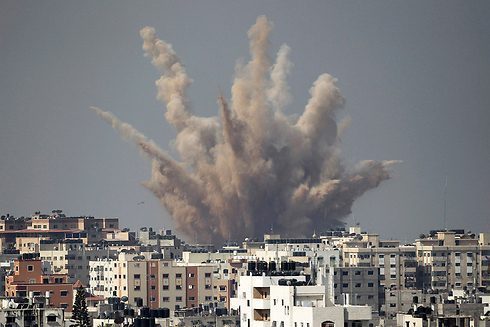
By: Mohamed Abu Saada*
– The Struggle to Survive and Extend
– Egypt … Where to?
Introduction:
Different Israeli media outlets have been dramatically shedding light on the economic, social, security and political situation in Egypt recently. Almost on a daily basis, the Israeli media kept discussing the Egyptian issue in detail. Perhaps this interest springs from several perspectives, particularly the geographic factor and Egypt’s demographic weight, as well as the Israeli security considerations and concerns regarding the uncertainty surrounding the Egyptian position and its future. The most prominent development was that the Israeli Jerusalem Post newspaper called the Egyptian leadership to assist in achieving a rapprochement in the relations between the Egyptian and Israeli peoples, as the Egyptian people still consider any rapprochement with the Israelis as treason.
The most important question remains: What does Israel want from Egypt?
What was discussed by the Jerusalem Post, one of the most prestigious Israeli newspapers, which was founded in 1932, was not surprising but it was a serious indication in continuation of previous signals sent by the official Israeli newspapers during the last period. In fact, such a move warns of an Israeli plot against Egypt. And in order to make things clear, I will try to arrange the issues discussed by the Israeli newspapers in the last period on several levels:
The first level:
A few years ago, the Israeli newspapers welcomed the overthrow of the rule of the Muslim Brotherhood and the advent of the Al-Sisi regime – after Al-Sisi’s military coup against Mohamed Morsi, the first democratically-elected president in Egypt’s modern history. Israel then considered this (Sisi’s action) as a great achievement that will enhance security in the region, which surely means Israel’s own security. This was confirmed by the head of the Israeli National Security Studies Institute, Amos Yadlin, in the context of an annual report that he wrote, titled “In the Face of the Strategic Threats to National Security”. He said the overthrow of the Muslim Brotherhood rule through a military coup led the Egyptian army to take over again, considering the Egyptian military as “the most positive institution for the Zionist entity among all the actors in the Egyptian political arena, as well as their (Egypt’s army) being hostile to Hamas”.
The second level:
The Israeli newspapers have recently been discussing the economic situation in Egypt, expressing fears that the economic conditions might lead to the overthrow of Sisi. Many Israeli reports and studies predicted an outbreak of a revolution by the hungry in Egypt. This was confirmed by the largest and most important Israeli newspapers in one of the studies which stated that the fate of al-Sisi will be similar to that of Mubarak.
The third level:
The Israeli newspapers have announced, in recent days, the desire of Israel to provide economic support to Egypt in order to maintain the existing regime. One of the reports explained that the Israeli entity is preparing to provide assistance to Egypt in the fields of the solar energy, production of electricity, agriculture, irrigation and gas. In addition, Egypt is studying the possibility of expanding cooperation with Israel in the tourism sector.
The fourth level:
The reports published by the Jerusalem Post that the Egyptian people consider any rapprochement with the Israelis as treason serve as an open invitation and clear request from the Egyptian leadership to improve the image of the Israelis in the minds of the Egyptian people. Here, we can read several things, namely:
- The Egyptian regime has received the signal sent via the Israeli media (in the third level), i.e. the desire of the Israeli authorities to provide economic aid to help the survival of the current regime in Egypt. The Israeli message to the current Egyptian administration can be understood that if the Al-Sisi regime wanted to get the Israeli economic support, it must improve the mental image of the Israelis within the Egyptian society.
- The Israeli leaders have now become well-aware that the current Egyptian regime is on the brink of collapse, so they are working to blackmail it with all means, taking advantage of the state of corrosion it is suffering from.
The fifth level:
It is a future prediction of what the Israeli media would do. It is expected that in the coming days, the Israeli newspapers would follow two strategies: the first strategy is to defend the current Egyptian regime; the second is to intensify their calls for improving the Israeli image in the Egyptian mind, associated with explicit calls for the normalization of Egyptian-Israeli relations openly.
Analytical readings in the Israeli signals and messages:
All the previous signals show that the Israeli entity is keen on the survival and continuity of the existing Egyptian regime, and by all means, in order to achieve the following:
First, politically:
Israel is interested in keeping Egypt “weak”, and accordingly becomes a tool in the hands of the Israeli politicians, and enables them to involve extensively in the daily and fateful issues of the Egyptian people.
Second, economically:
Israel wants, through its alleged economic projects, to penetrate into the Egyptian affairs, specifically in the Sinai Peninsula, through the establishment of Israeli tourist resorts there, as well as the exploitation of gas off the coast of El Arish.
Third, strategically:
The Israeli leaders try to exploit the major economic crises that the current Egyptian regime is suffering from to achieve two things, namely:
- Resettlement of a large number of Palestinian refugees in the El-Arish area after Gaza has become a demographic bomb threatening the Israeli areas adjacent to its borders.
- The creation of an Egyptian generation that looks at Israel as a friendly state, believes that the achievement of a better life in Egypt will be only through the tolerance and coexistence with the Israeli entity, and understands the Israeli aggressive actions in the Arab region.
Conclusion:
I will here attempt to answer two questions:
The first question is: Will the Israeli entity succeed in providing economic support to the current Egyptian political regime?
To answer this question, we must at first acknowledge that Egypt needs a huge economic support, something which cannot be done by only one country, regardless of its strong economic system. Also, Israel could provide economic projects, but in fact, they would not save the current Egyptian regime. Instead, they would blackmail the regime with the aim of controlling Egypt and achieving specific goals within a specific period of time. It is also expected that the Israeli economic projects would primarily serve the interests of the Israeli entity, and prolong the existence of the Al-Sisi regime, which means a continuation of the internal deterioration in Egypt, economically, socially, and politically. This would inevitably worsen the situation in Egypt, which means that “any coming Egyptian political regime – after the fall of Al-Sisi – would not be able to achieve any reforms after things reach up to the point of collapse.”
The second question is: Will the Egyptian regime respond to the Israeli demands and call the Egyptian people for normalization with Israel? And will this move succeed?
We can say that the Egyptian media – since the advent of the Al-Sisi regime – keeps inciting against the Palestinians and supporting the Israelis on some issues, such as their (the Egyptian media) coverage of the Israeli aggression on Gaza in 2014. These attempts may be understood as calls for a rapprochement between the Egyptian and the Israeli peoples. In fact, we can say that the Egyptian media has left an impact among some segments of the Egyptian society, which started to adopt an almost unprecedented hostile attitude toward the Palestinians. However, on a theoretical basis, a relationship between two countries cannot be normalized except after the passing of 30 years (a whole generation) without any problems. This seems impossible to happen, especially if we look deeply into how likely the current Egyptian regime could survive. Also, it is impossible that Israel will remain without involvement in wars with Arab countries and
However, on a theoretical basis, a relationship between two countries cannot be normalized except after the passing of 30 years (a whole generation) without any problems. This seems impossible to happen, especially if we look deeply into how likely the current Egyptian regime could survive. Also, it is impossible that Israel will continue without involvement in wars against Arab countries and without committing massacres during these wars; as it is founded on a “security doctrine and ongoing wars.” Moreover, there are strong religious ties between the Egyptian people and the Arab peoples.
*Mohamed Abu Saada, a Palestinian researcher, is to get a doctorate in political science from Turkish Sakarya University. He got his Master degree in Political Science on “Iran’s policy towards the Islamic resistance movements in Palestine”.
(Published in the Egyptian Institute for Political and Strategic Studies – eipss – on Nov. 6, 2016, and translated for MEO)



